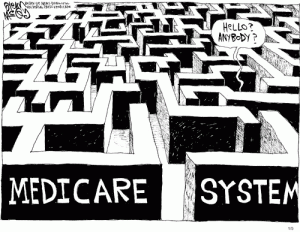A must attend keynote?
By Steve Moran
With the recent release of the NIC occupancy numbers, you might think I am suggesting that you go to the NIC Fall Conference to hear what others are thinking about occupancy. And I guess — in some sense — you are right, because that is a good reason to be there this October. However, the even wilder ride is going to come from Vivek Wadhwa, the keynote speaker for the conference luncheon on Thursday. His topic is “AI, Robots, Smart Apps and Senior Care – The Future is Near”.
Unfulfilled Promise
I don’t know about you — and with no disrespect to all of the folks currently selling technology solutions to our senior living world — I find myself with this kind of pit-of-the-stomach, gut-level thinking that technology has not yet lived up to its promise when it comes to elders, both in and out of senior living.
So when I saw what the topic was, I thought what the heck, I wonder if he would talk to me in advance of the conference. It was — in my experience — kind of a longshot, especially with a speaker of this caliber. But, he said yes!
Vivek Wadhwa Who?
Yep, I kind of had that thought too. Yet, he is someone worth paying attention to. He is a Distinguished Fellow at Carnegie Mellon University’s College of Engineering in Silicon Valley and with Harvard Law School. He’s also a globally syndicated columnist for The Washington Post and the author of a number of books.
The Wild Ride
We spent a fascinating 20 minutes on the phone talking about the aging population and what it is we might gain from the world of technology, and about what it might mean for senior living. Here are the highlights:
-
For the last 50-100 years, there has not been much innovation in healthcare. You see a doctor, get a few tests, followed by a prescription for some medicine, followed by a pat on the head as you head out the door.
However, Vivek believes that we will see radical innovation in the next ten years that will completely change everything, allowing us to live to 150 or 200 years. Not as radical as Ray Kurzweil — who has a notion that he/we can live forever — but nonetheless pretty radical.
-
Vivek believes we will each have an AI assistant in the next five years, which will allow us to have much more control over our health and that the AI will do a better job — in many cases — than doctors.
-
He anticipates robot assistants and driverless cars (which are sort of already here) for seniors who have short distance, slower speed transportation needs, like to the market, medical appointments, and movie theatres.
-
He expects 3D printing to replace joints and organs — including hearts — so that we will never again have to worry about finding matching donors.
-
He expects to see nanobots that will crawl into and over our bodies to make repairs, creating the ability for technical medicine.
Unintended Consequences and Senior Living
As he was talking, I was thinking this could actually destroy senior living, so I asked what he thought. His immediate response was that he felt it would be just the opposite. He expects senior living to be one of the biggest beneficiaries — that these technology innovations would help senior living residents live longer and healthier. Thereby, allowing people to be better able to take advantage of the socialization benefits of senior living.
What we did not really touch on — and I hope we will hear about — are the unintended consequences of these innovations:
-
How do we pay for it?
-
How do we pay for retirements that could last half a century?
-
If people live and work so much longer, what will happen to the job market for young people?
-
Will we end up with too many people for the resources of the planet to support?
-
What about the inequality of people in the western world having more access to these advances?
It should be one of the most important keynotes of the year to watch.
You can register for the NIC conference at www.nicevent.org. Hope to see you there.










